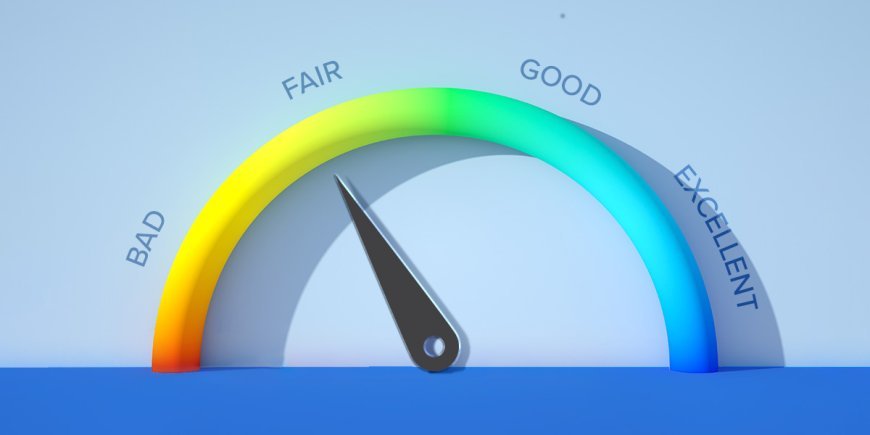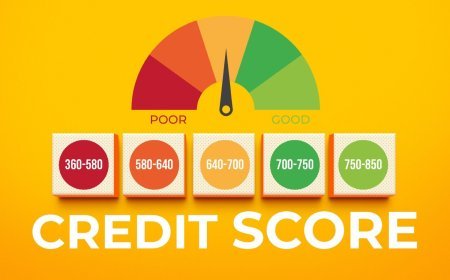How to Improve Credit Score: Simple Steps for a Healthier Financial Future
Improving your credit score is a key step toward better financial health and unlocking new financial opportunities. You can significantly boost your score by making on-time payments, keeping your credit utilization low, and maintaining a diverse mix of credit accounts. This article was written by both financemastering.com and usbestnews.com teams.

Improving your credit score is a key step toward better financial health and unlocking new financial opportunities. You can significantly boost your score by making on-time payments, keeping your credit utilization low, and maintaining a diverse mix of credit accounts. A higher credit score not only helps you secure loans at better interest rates but also gives you an edge when applying for rentals or even certain jobs.
Many people overlook how simple actions can lead to big changes in their credit score. Paying bills on time is a crucial habit that sets a solid foundation for your credit profile. Additionally, staying informed about your credit report and addressing errors can further enhance your score and improve your financial future.
As you take these steps to improve your credit score, you’ll find that a little effort can lead to greater financial freedom. Knowing how to effectively manage your credit can open doors to better loans, housing options, and more.
Understanding Your Credit Score
Your credit score is a key part of your financial health. Knowing how it’s calculated and how to read your credit report can help you manage your finances better. Here’s what you need to understand about the components, the role of credit bureaus, and how to read your credit report.
Components of a Credit Score
A credit score is made up of different parts that reflect your financial behavior. The most important components are:
- Payment History (35%): This shows if you pay your bills on time. Late payments can hurt your score.
- Amounts Owed (30%): This refers to your total debt compared to your credit limit. Keeping your balances low helps improve your score.
- Length of Credit History (15%): A longer credit history can positively impact your score. It shows creditors that you are a responsible borrower.
- Types of Credit Used (10%): Having a mix of different types of credit, like credit cards and loans, can be beneficial.
- New Credit (10%): Opening too many new accounts at once can signal risk, impacting your score negatively.
Reading Your Credit Report
Your credit report contains important information about your credit history. It includes details such as:
- Personal Information: Your name, address, and Social Security number.
- Account Information: All your credit accounts, including credit cards, loans, and payment history.
- Inquiries: These are records of when you or lenders checked your credit. Too many inquiries can lower your score.
You can obtain your credit report for free once a year from each of the three major credit bureaus: Equifax, Experian, and TransUnion.
Regularly checking your report helps you spot errors and track your credit progress.
The Role of Credit Bureaus
Credit bureaus are companies that collect and maintain your credit information. They play a big role in calculating your FICO score, which is widely used by lenders. The main bureaus are:
- Equifax
- Experian
- TransUnion
These bureaus gather data from your creditors and lenders to create your credit report. This report is what lenders use to assess your risk as a borrower. If you notice any errors, you have the right to dispute them, and the bureaus must investigate. Keeping your information accurate is crucial for maintaining a healthy credit score.
Strategies for Boosting Your Score
Improving your credit score involves specific actions that can make a big difference. Focusing on timely payments, managing credit utilization, and being cautious with new credit inquiries can significantly enhance your score.
Timely Bill Payments
Making on-time payments is one of the most crucial steps in boosting your credit score. Your payment history accounts for a large portion of your credit score calculation. Late payments can lower your score and remain on your report for up to seven years.
To ensure you never miss a due date, consider setting up automatic bill pay. This way, you can manage your payments easily and avoid those pesky late fees.
Even if you can’t pay the full amount, making at least the minimum payment on time is important.
You can also set reminders for your bills through your phone or email. Small changes in your habits can lead to better credit health over time.
Optimizing Credit Utilization
Credit utilization shows how much of your available credit you use. You want to keep this percentage low, ideally below 30%. High utilization can signal risk to lenders.
To improve your credit score, aim to keep your credit card balances low. Here are a few tips:
- Pay off your credit card balances regularly.
- If you have multiple cards, spread out your expenses to maintain a lower utilization rate on each card.
- Consider requesting higher credit limits on your cards. This could help lower your utilization ratio if you don’t increase your spending.
By managing your credit wisely, you can show lenders that you are a responsible borrower.
Limiting New Credit Inquiries
Whenever you apply for new credit, a hard inquiry appears on your credit report. This can temporarily lower your score. It’s best to limit new credit applications, especially in a short time frame.
Before applying for new credit, think it through. Ask yourself if you really need another credit card or loan.
If possible, research your options using pre-qualification tools, which don’t affect your score.
If you do need to apply for new credit, try to do it within a short time span. Multiple inquiries for the same type of credit, like a mortgage or auto loan, can be treated as a single inquiry. This approach can help you minimize the impact on your score.
Managing Your Debts
Managing your debts effectively is crucial for improving your credit score. By understanding interest rates, reducing outstanding balances, and exploring debt consolidation options, you can take control of your financial situation.
Understanding Interest Rates
Interest rates play a significant role in debt management. When you borrow money, whether through credit cards or personal loans, the interest rate determines how much you’ll pay over time.
For example, credit cards often have higher interest rates than installment loans. It’s important to know the rates on your debts. The higher the interest, the more you pay in the long run.
To save money, try to pay off high-interest debts first. Focus on making more than the minimum payments when possible. This strategy reduces the amount owed and helps you pay off debts faster.
Reducing Outstanding Balances
Reducing your outstanding balances is key to managing debt. This means paying down what you owe on credit cards, personal loans, or any other debts.
Start by creating a budget to track your income and expenses. Set aside a specific amount each month for debt repayment.
You can also consider the snowball method, where you pay off the smallest debts first to build momentum.
Additionally, keep your credit card balances low. A good rule of thumb is to use no more than 30% of your credit limit. This helps maintain a healthy credit utilization ratio, which positively impacts your credit score.
Debt Consolidation Options
If you find it hard to manage multiple debts, debt consolidation might be a solution for you. This involves combining your debts into a single loan or credit line, often with a lower interest rate.
There are several options for debt consolidation. One popular choice is a personal loan. You can take out a loan to pay off higher-interest debts, leaving you with one monthly payment.
Another option is a balance transfer credit card. These cards often offer an introductory 0% APR for a limited time. This can help you save on interest while you reduce your debt.
Before choosing a consolidation method, consider the terms and fees involved. Make sure it aligns with your financial goals.
Credit Cards and Your Credit Score
Using credit cards wisely can significantly impact your credit score. This section covers how your credit card use affects your score, how to choose the right card, and how to manage card limits effectively.
The Impact of Credit Card Use
Your credit card use plays a key role in determining your credit score. One important factor is your credit utilization ratio, which is the amount of credit you’re using compared to your total limit. Aim for a ratio below 30% to maintain a good credit score.
Making on-time payments helps build your credit history. Late payments can hurt your score, so set reminders or automate payments.
Using your credit card as a credit-building tool can be effective if managed properly.
Consider a secured card if you’re new to credit. These require a deposit that acts as your credit limit. They can help improve your score when used responsibly.
Choosing the Right Credit Cards
When selecting a credit card, look for options with no annual fees and reasonable interest rates. Many credit card issuers offer rewards for everyday purchases.
Consider cards that help build credit, especially if you have a low score. Some cards are specifically designed for this purpose. Research the options available to find one that suits your spending habits.
Checking your credit score regularly can help you find the right card. Knowing where you stand allows you to pick a card that meets your needs and boosts your credit.
Navigating Credit Card Limits
Managing your card limit is crucial for keeping your credit score healthy. Higher limits can benefit your credit utilization ratio, but make sure not to overspend.
If you’re approved for a higher limit, resist the temptation to use it all. Instead, keep your spending low and pay off your balance in full each month.
Using multiple cards wisely is another way to manage limits. This diversifies your credit and can improve your score, as long as you monitor your overall utilization ratio. Remember, responsible use is key to leveraging credit cards effectively.
Building a Healthy Credit Mix
Creating a balanced credit mix is important for your credit score. Different types of credit can show lenders that you can handle various financial responsibilities. This section covers types of credit accounts, the benefits of diversity in your credit portfolio, and how to use installment loans wisely.
Types of Credit Accounts
A healthy credit mix includes several types of credit accounts. Here are the main categories:
-
Revolving Credit: This includes credit cards. You can borrow up to a limit, pay it off, and borrow again. Responsible usage is key.
-
Installment Loans: These are loans paid over time, like auto loans or student loans. You make regular monthly payments until the loan is finished.
-
Retail Credit Accounts: These are store-specific cards. They usually have higher interest rates and should be used sparingly to avoid debt.
Each account type contributes to your overall credit profile. Check your credit report at annualcreditreport.com to see what accounts you have and consider adding different ones if needed.
The Benefits of a Diverse Credit Portfolio
Having a mix of credit types can improve your creditworthiness. Lenders like to see that you can handle various forms of credit. Here are some benefits:
- Better Credit Score: A diverse portfolio can positively affect your credit score by showing you manage different types of credit responsibly.
- Lower Risk for Lenders: When you manage various accounts well, it makes you appear less risky to lenders.
- Potential for Higher Credit Limits: With a good mix and payment history, you may qualify for higher credit limits and better interest rates.
Make sure to avoid late payments, as they can harm your score and make it harder to maintain a healthy mix.
Using Installment Loans Wisely
Installment loans can be a great way to build your credit. Here are some tips to manage them wisely:
-
Make Timely Payments: Always pay on time to avoid late payments. Late payments can damage your score.
-
Keep Balances Low: Borrow only what you can afford to pay back. High balances can make you appear risky to lenders.
-
Be Mindful of Hard Inquiries: Too many hard inquiries in a short time can lower your score. Limit applications to maintain a healthy credit profile.
Using installment loans effectively contributes positively to your credit mix. It can help you build credit over time.
What's Your Reaction?
 Like
0
Like
0
 Dislike
0
Dislike
0
 Love
0
Love
0
 Funny
0
Funny
0
 Angry
0
Angry
0
 Sad
0
Sad
0
 Wow
0
Wow
0












































